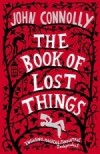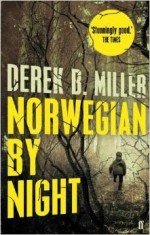
The Book of Lost Things is magnificent; it pleases on so many levels. It’s an adventure, a quest, an examination of the psyche of childhood. It’s a labyrinthine journey through the worlds and the landscapes of fairy tale. With more twists than you’d find on a stick of barley sugar on the witch’s house in Hansel and Gretel.
With a book so overflowing with riches, it ‘s difficult to know where to start. Maybe I’ll start at the end. No, there are no spoilers. I wouldn’t do that to anyone, especially not to someone who has yet to read it. I’m starting at the end because my reaction demonstrates the power of this book. I cried. Yes, I cried when I read the last chapter. It was sad, realistic, poignant and anything but sugar coated. A truly fitting ending for an extraordinary book.
The Book of Lost Things introduces us to David who is 12. His mother is dying and David, helpless, does everything he can to keep her alive. In his description of David’s rituals of touching and counting, John Connolly offers a most sensitive and enlightening explanation of Obsessive Compulsive Disorder (OCD) and its triggers. He gets inside the head of a small boy who thinks his mother died because he didn’t do enough to keep her alive.
“Something tore inside him every time he saw his father holding the new arrival.” Increasingly miserable and angry, David retreats into his own world.
Left alone, David and his father cope as best they can. At least they have each other. Then Rose comes along. Then the baby. David, trying to come to terms with the death of his mother, watches bewildered and hurt as his father transfers his attention to his new family. “Something tore inside him every time he saw his father holding the new arrival.” Increasingly miserable and angry, David retreats into his own world. A world where books talk among themselves. A world which has a parallel in which a missing boy ‘passed unseen through David’s world, unaware that he shared his bed each night with a stranger.’
As his fury and grief mount, David’s thinks constantly of his mother until a day comes when he hears her voice. Her voice calling to him, begging him to rescue her. Summoning him to the sunken garden. As her voice, becomes ever more insistent he is forced to overcome his fear of the place and to follow. What happens next is yet another demonstration of John Connolly’s skill as he welds reality to unreality. The seeds of the eventual denouement are sown; they are there, but as light as those on dandelion clock.
From now on we are in the world of the brothers Grimm and of myth, legend and fairy tale. A world of monsters and harpies, of trolls and dwarves. Of wicked stepmothers and weak kings. Of sleeping princesses and enchanted castles. Peopled with woodsmen and hunters and bears and monsters. Above all, it is the world of the crooked man. The crooked man who steals children who are never seen again. The crooked man who wants something David can give him. Who will stop at nothing until he gets it.
We also have trolls who suffer from severe acne. A prince who ‘ponces in like a big, perfumed tea cosy.’ A Snow White who is fat and a group of quarrelsome, Marxist dwarves.
As David battles to reach the king whom, he hopes, can help him he is aided along the way by a variety of characters. The woodsman, the dwarves – eventually – and Roland, of Childe Roland, among others. All tell him stories that would be familiar but that they have, at the author’s hands, undergone subtle and not so subtle transformations. To say much more would be to spoil the surprise, and the fun. Suffice to say that the way John Connolly re-imagines these tales is masterful. Both in the wealth of his imaginings but also in the way he relates them to the psyche of a twelve year old who has lost his mother and who is struggling with his feelings towards his father, stepfather and stepbrother.
There is tension aplenty in this book. It also brims over with wit and humour. David, for instance, loses patience with the woodsman who was ‘fine for decapitating wolves and giving unwanted advice’ but who was falling short at keeping up with developments in the kingdom. We also have trolls who suffer from severe acne. A prince who ‘ponces in like a big, perfumed tea cosy.’ A Snow White who is fat and a group of quarrelsome, Marxist dwarves. Though to quote David’s own words ‘for a group of homicidal, class obsessed small people, they were really rather fun.” Why Marxist dwarves? The explanation is ingenious and worth waiting for.
I cried when I read the last chapter. It was sad, realistic, poignant and anything but sugar coated. A truly fitting ending for an extraordinary book.
Beautiful language, intricate, colourful and disturbing imaginings. Wit, fun and learning. You’ll find them all between the covers of this book, but there’s more. When you’ve finished you’ll find an interview with the author, in which he gives a very personal and enlightening account of his approach to the book. There follows a commentary on each of the fairy tales, in the sequence in which they appear. Each one is linked to a relevant passage in the book and references modern films and books inspired by the tales. Finally we have one of the traditional versions of the story.
As I read them I was tempted to regret that I hadn’t read them first, to remind myself of some of the stories I had forgotten. On reflection, though, I’m glad I didn’t. The book is complete in itself. The additions are akin to a literary liqueur, something to linger with and enjoy with the coffee – afterwards.
 In order to do this book justice, I have to confess that the way I read it almost certainly detracted from the impact it had on me. I read it in snatches, on my iPhone, on the bus. With sometimes a week or even weeks between each reading. Inevitably my experience was disjointed. I believe that had I read it as a paperback, or even on my iPad, with more continuity, my initial experience might have been different. Indeed re-reading it, or rather re-skimming it, I am seeing things I didn’t give myself the leisure to notice before.
In order to do this book justice, I have to confess that the way I read it almost certainly detracted from the impact it had on me. I read it in snatches, on my iPhone, on the bus. With sometimes a week or even weeks between each reading. Inevitably my experience was disjointed. I believe that had I read it as a paperback, or even on my iPad, with more continuity, my initial experience might have been different. Indeed re-reading it, or rather re-skimming it, I am seeing things I didn’t give myself the leisure to notice before.


